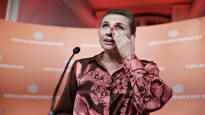The Danish government submits its resignation today. The future government negotiations are predicted to be long and difficult.
COPENHAGEN Politics is sometimes unbelievable! This must be said when Denmark’s election night turns to morning. The race between the left-wing and right-wing bloc was only resolved with chalk lines, when the last votes were counted in the Faroe Islands and Greenland.
The Prime Minister moved by the eyes Mette Frederiksen thanked the party people at the election supervisors held in Christiansborg Castle.
– Dear Danes, I am so extremely happy and proud, Frederiksen began his speech to his supporters.
From the beginning of the evening, the victory of the Social Democrats still seemed very uncertain. The door-to-door polls predicted significantly lower support for the Danish Dems than the actual 27.5 percent.
The election victory is noteworthy, when taking into account Frederiksen’s adversities as prime minister during the corona pandemic. Accusations of arbitrarily handling the pandemic eventually led to early elections.
The background of the election was the threat of the social liberal Radikale Venstre party to withdraw support from Frederiksen’s government, when the decision to end the Danish mink stock exposed to the corona had proven to be illegal.
The accusations against Frederiksen apparently did not move the voters, who rewarded the Social Democrats with the best election result in twenty years.
The election victory of the Social Democrats also ensured that the left-wing bloc – including the Radikale Venstre – will retain its majority in the Danish parliament by one representative.
However, according to Frederiksen, it is clear that the Social Democratic minority government that has led Denmark since 2019 has no parliamentary support after the elections. The current government will submit its resignation notice to the Queen today.
Frederiksen’s goal is to expand the government base. In practice, this could mean allocating ministerial portfolios to current support parties or cooperating with the centre-right.
According to Frederiksen, government negotiations could start with Venstre, the largest party in the right-wing bloc. Negotiations with the party that suffered a crushing defeat will most likely remain a formality.
by Lars Løkke Rasmussen on the other hand, attracting a moderate party to the government can be successful. The ex-prime minister has avoided locking in his positions before the elections. In his speech to the party Løkke Rasmussen emphasized the importance of cooperation and the need for social reforms.
The majority of the left bloc gives Frederiksen an advantage in the upcoming government negotiations. lma majority by Løkke Rasmussen the moderates would have been able to play the right-wing bloc and the left-wing bloc using the horizontal position.
Expanding the board base is not without problems. A handshake to the right can alienate the social democrats’ left-wing support parties.
– Starting negotiations with the right-wing is not right when there is a red-green majority in the parliament, the chairman of the left-wing Einheidslisten Mai Villadsen said in a debate held in the wee hours.
Government negotiations are said to be long and difficult. Denmark’s fragmented party field makes the task of forming a government more difficult.
The emergence of a broad-based government could have far-reaching effects on the political system built on Denmark’s bloc politics.
Read also:
Prime Minister Mette Frederiksen, marred by the mink scandal, is struggling for her position in Denmark’s early elections
